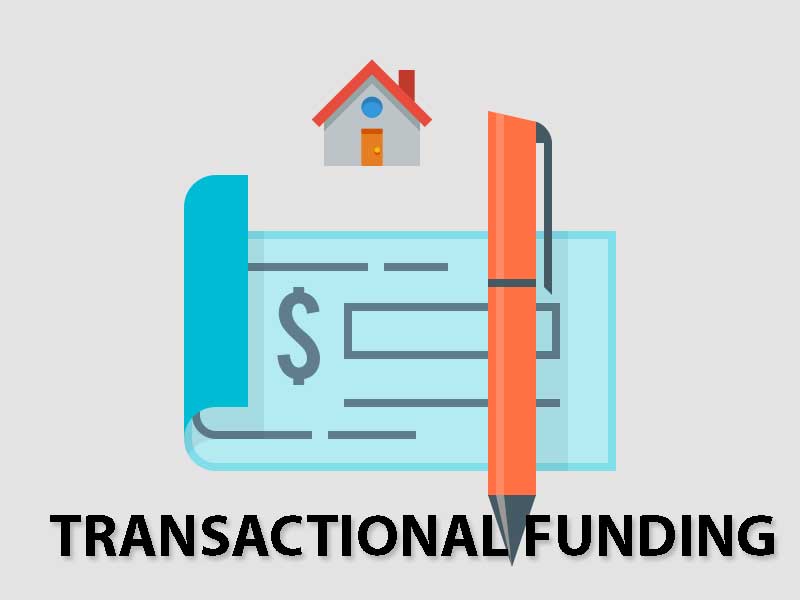When you wholesale properties through simultaneous closing (or double closing), you need two sets of transactions, one when you buy, and one when you sell. You can finance the first transaction with your own cash if you have it, or you can use transactional funding.
Transactional funding continues to be the easiest and fastest way for real estate investors to finance their wholesale real estate transactions. When do you use it? How does it work? When won’t it work?
Transactional funding, also called flash funding or same-day funding, is a short-term funding to finance purchase of a property, provided an end buyer will purchase the property shortly afterwards. The wholesale real estate investor buys the property using transactional funding, then sells it to his end buyer in a simultaneous closing.
Transactional funding is used for short-term real estate deals where they buyer needs short-term cash to buy a property, then re-sell it for a profit shortly afterwards. Transactional funding allows investors to get in and out of deals quickly by creating two separate transactions.
It’s usually paid back the same day, and as long as a whole week. This funding allows real estate investors to buy and sell properties without using their own money.
In a perfect world, a wholesaler needs to assign a property and walk home with an assignment fee. However, this is not always possible. For example, if you’re making too much money in the deal, your end buyer might not be comfortable when they see what you’re making, and they could back off or re-negotiate.
Or the property could be owned by a bank or government entity who don’t allow assignments, such as HUD, FHA, Fannie Mae, etc. Or you live in a state that does not allow assignments (e.g. Illinois).
In this case, you can wholesale by doing a double closing (simultaneous closing) – and you’ll need some money to do the first closing where you buy.
Most lenders today do not allow their money to close the first transaction. You therefore need short-term funds for this before you can complete the second transaction. This is where you need transactional funding.
Transactional funding is known for being quick to get and qualify for.
A quick history of transactional funding
Before 2008, it was fairly common for real estate investors to use their buyer’s cash to finance the first transaction.
Lenders then tightened their requirements, requiring the wholesaler to come up with their own cash to close the first transaction. Not every wholesaler has the cash, and so transactional funding was born.
Since then, a lot of transactional funding lenders have popped up, and they’ve become an invaluable part of real estate investing.
Transactional funding is used almost exclusively for wholesale real estate, where the investors turn around properties without doing any real work on them. Assigning the property limits the amount of cash you can make on the deal, limiting your profit potential.
Transactional funding solves this by giving real estate investors the cash they need to close on the buy side, and turn around and sell it at a profit on the same closing table.
How does it work?
Here’s how transactional funding works:
- The real estate investor finds a motivated seller. Both parties agree to a price, and put the property under contract.
- The investor / investor finds a buyer for the property, and they sign a new purchase and sale agreement, usually at a price higher than the first contract.
- The investor then secures transactional funding, to buy the property from the seller.
- When both transactions are complete, the proceeds go to pay off the transactional funding loan, plus any agreed fees. The investor keeps the difference as their profit.
Advantages of using transactional funding
This type of funding allows you to conduct legal back to back closings without using your own money. It protects the privacy of the deal with the seller, thereby allowing you to make more than you’d make with a simple contract assignment.
If there’s a lot of money for you in the deal, say $20,000, most investors won’t feel comfortable to see you walking home with so much. A regular contract assignment would net you around $5,000.
Why leave so much on the table if you don’t have to?
Secondly, transactional lenders typically don’t require appraisals, full title reports and insurance. This cuts down transactional costs, leaving more profits on the table for you, and speeding up the process.
Most lenders offer these funds in a matter of days.
This funding comes with fewer headaches. No credit checks, proving your job or income, debt to income ratios, etc. Obviously because of this, there’s less risk that the deal will fall apart.
Most transactional funding lenders offer 100% financing. The investor doesn’t have to put any money to close the deal.
Transactional funds are usually cheaper than hard money loans, and fees are paid at closing.
The big catch is that most lenders require you have a cash buyer for the property, and their financing is in place. Be sure your end buyer knows you’re using transactional funding, as some lenders don’t like the short turn-around time. Most won’t have an issue as long as the deed is your name in the second transaction.
If the deal doesn’t close within the agreed time-frame, there may be additional fees and interest that will east into your profits.
How much does it cost?
Most transactional funding is cheaper than hard money. It usually depends on the loan amount and the term of the loan.
Usually they range from 1% to 2.5%, but this can be more expensive if the term extends.
A transactional lender typically needs their money back in 1-3 days, sometimes up to a full week.
Extended transactional funding
If you have to take transactional funding for an extended time – such as the second transaction falls through – expect to pay more.
Some lenders will provide extension up to 30 days, others can go as long as one year. Typically, this will become expensive, and you’d be better off refinancing such a loan as fast as you can.
You can explore other types of real estate financing when you need longer term financing options.



 >
>

More Leads Than You Can Handle?
Free Ebook reveals a "hidden" treasure trove of super motivated sellers ready sell their houses in your local market.
No other investors know about these hot leads. You can afford to get picky and take only the low hanging fruit closing the most profitable deals.
Enter your email below to receive this Ebook instantly.
Congratulations! Ebook has been sent to your email.